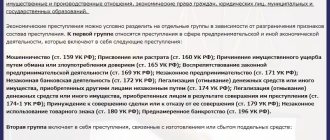There is no concept of “continuing crime of the Criminal Code of the Russian Federation”.
At the same time, a number of articles of the Criminal Code provide for liability for those acts that occur systematically or involve no action at all. It is possible to distinguish between ongoing and continuing criminal offenses, and practice shows that this is successfully implemented within the framework of unified complex offenses. Multi-channel free hotline Legal advice on criminal law. Every day from 9.00 to 21.00
Moscow and region: +7 (495) 662-44-36
St. Petersburg: +7 (812) 449-43-40
A continuing crime. Definition of the concept
The Criminal Code of the Russian Federation does not contain the concept of a continuing crime.
The concept of a continuing crime was given in the Resolution of the 23rd Plenum of the Supreme Court of the USSR dated 03/04/1929 “On the conditions for the application of limitation and amnesty to ongoing and continuing crimes”, where a continuing crime is considered as an action or inaction associated with subsequent long-term failure to fulfill the duties assigned to guilty by law under threat of criminal prosecution.
In judicial practice, an approach has been developed according to which a continuing crime is understood as a criminal act characterized by an initial act of action or inaction and then continuing over time.
A continuing crime begins and forms the completed corpus delicti of a specific crime either from the moment of commission of the first criminal act (for example, when leaving a unit or place of service without permission (Article 337 of the Criminal Code of the Russian Federation) - from the moment of leaving the territory or place of service without legal grounds), or from an act of criminal inaction (for example, when evading military and alternative civil service (Article 328 of the Criminal Code of the Russian Federation) - from the moment of failure to appear on a summons at a recruiting station or other designated place without good reason). Such a crime ends as a result of either the action of the culprit himself, aimed at stopping the crime (for example, turning himself in), or the occurrence of events that prevent the further commission of the crime (for example, intervention by authorities), or when the obligation itself, the failure of which constituted the content of the ongoing crime, has disappeared (for example, with the death of a child or a disabled parent, the obligation of the perpetrator to pay funds for their maintenance, by a court decision, ceases).
The application of statutes of limitation and amnesty depends on the nature of the crime.
Establishing the nature of the crime—continued or ongoing—is necessary not only for correct qualification (for example, distinguishing a continuing crime from an aggregate crime), but also for resolving a number of other important issues: the application of statutes of limitations, amnesty, sentencing, etc.
Calculation of the statute of limitations for a continuing crime
Recognition of an act as a continuing crime affects the calculation of the statute of limitations (Article 83 of the Criminal Code of the Russian Federation).
For continuing crimes, the statute of limitations is calculated from the moment the crime actually ceases, both at the will of the perpetrator and for reasons independent of his will (detention, confession).
Application of amnesty for ongoing crime
Recognition of a crime as ongoing affects the application of the amnesty act (Article 84 of the Criminal Code of the Russian Federation).
An amnesty act usually applies to criminal acts committed before its adoption or entry into force.
When committing ongoing crimes, the amnesty is applied if the act was stopped before the entry into force of this act. However, exceptions to this rule are possible, established by the amnesty act itself. In other words, an amnesty can be applied to a perpetrator (if it applies to that person) only if the person was detained or turned himself in before the amnesty decree was issued.
Distinguishing between a continuing crime and a set of crimes
A continuing crime must be distinguished from a cumulative crime.
Aggregate crimes - the commission of two or more crimes, for none of which the person was convicted, except for cases where the commission of two or more crimes is provided for by the Special Part of the Criminal Code of the Russian Federation as a circumstance entailing a more severe punishment, as well as one action (inaction) containing signs of crimes provided for by two or more articles of the Criminal Code of the Russian Federation (Article 17 of the Criminal Code of the Russian Federation).
A continuing crime is a single complex crime expressed by an action or inaction, associated with subsequent long-term failure to fulfill the duties imposed on the perpetrator by law under threat of punishment. These crimes are committed over a more or less long period of time. They are characterized by the continuous implementation of the crime. A continuing crime is characterized by the performance of one action or inaction, which is not interrupted until it is suppressed or terminated, which distinguishes it from a continuing crime.
A continuing crime is an act associated with subsequent long-term failure to fulfill the duties assigned to the perpetrator under the threat of criminal prosecution. A continuing crime consists of a number of legally identical acts, united by a single intent, the unity of the object of the attack and the criminal consequences. For example, actions aimed at malicious evasion of a parent from paying child support. That is, a continuing crime cannot be divided into different elements of crimes due to their similarity, unity of purpose and consequences.
Ongoing crime
A continuing offense is characterized by the intent of the offender (the objective side), which is aimed at achieving a criminal goal through the methodical execution of smaller, but also socially dangerous actions. If an employee steals individual parts of any equipment for a long time for the purpose of creating one working unit, then this crime will definitely be classified as ongoing.
Features of this type of act:
- the presence of more than two identical actions;
- each action can be qualified as an independent crime, but cannot be imputed as such;
- the presence of direct or indirect intent is mandatory;
Violation of the law will continue until the final goal is achieved, completing a series of similar actions.
Continued violations of criminal law include:
- Torture (Article 117). The disposition of the article provides for the presence of systematic bullying actions towards the victim.
- Bribe (Article 290). It may be considered continued if the receipt of a bribe was systematic, and the bribe-giver was the same person or the protection was carried out in relation to one object.
A peculiarity of such a violation of the law is the determination of the moment when it ends.
As a general rule, this moment is determined by the last action actually performed. If such a moment is determined, and the person has not been brought to justice, then the rules on amnesty or dismissal of charges after the expiration of the statute of limitations may be applied to him.
Such a violation of the law must be systematic in nature: for example, the seller weighed goods daily in violation of the norms.
Factors that characterize a crime as ongoing are related to time intervals:
- identical actions must be carried out periodically and systematically;
- these actions are identical in relation to the context of the commissions and their sources.
Only the court, based on the evidence presented, can determine whether the actions are identical or whether they are independent elements.
Examples of continuing crimes
Examples of continuing crimes are:
— malicious evasion of payment of funds for the maintenance of children or disabled parents (Article 157 of the Criminal Code of the Russian Federation). The moment of the end of the crime is associated with the last day of evasion, i.e. when the guilty person confessed to the internal affairs bodies, either he was discovered (if he was wanted), or on the day of the child’s coming of age (acquiring the ability to work).
- production, acquisition, storage, transportation or sale of unmarked goods and products (171.1 of the Criminal Code of the Russian Federation). Liability begins from the moment storage begins, regardless of its duration;
— illegal trafficking of precious metals, natural precious stones or pearls (Article 191 of the Criminal Code of the Russian Federation). Possession of the items specified in the article is a continuing crime, which is completed from the moment storage begins, regardless of its duration.
- hostage taking (Article 206 of the Criminal Code of the Russian Federation). The crime is considered completed from the moment the victim is deprived of his actual freedom;
— illegal possession of weapons (Article 222 of the Criminal Code of the Russian Federation);
— escape from places of imprisonment, pre-trial detention and from custody (Article 313 of the Criminal Code of the Russian Federation);
- evasion of serving a restriction of freedom, imprisonment, as well as the application of compulsory measures of a medical nature (Article 314 of the Criminal Code of the Russian Federation);
— failure to comply with a court verdict, court decision or other judicial act (Article 315 of the Criminal Code of the Russian Federation). A crime begins from the moment of malicious failure to execute a judicial act within the period established by law or from the moment of obstruction of its execution within the same period and ends from the moment the perpetrator is brought to justice or the execution of a court order;
- concealment of crimes (Article 316 of the Criminal Code of the Russian Federation). The crime can be ongoing in the case of, for example, long-term storage in one’s home of items obtained by criminal means;
— evasion of military and alternative civil service (Article 328 of the Criminal Code of the Russian Federation). If a person fails to confess or is not detained, these crimes are terminated due to the loss of his obligations to conscript into military service or perform alternative civilian service. This moment should be considered the person reaching the age after which the specified duties under no circumstances can be assigned to him, or the age that is the limit for being in the alternative civil service. The starting point for calculating the statute of limitations for bringing criminal liability for this crime begins at 0 o'clock on the day following the offender's birthday after he or she reaches 27 years of age;
- unauthorized abandonment of a unit or place of service (Article 337 of the Criminal Code of the Russian Federation). The moment of the end of the crime is the time when the perpetrator voluntarily ceased his criminal stay outside of service or when this crime was suppressed by the military command or authorities;
- desertion (Article 338 of the Criminal Code of the Russian Federation). The crime lasts for the entire time the perpetrator is illegally outside the military unit or place of service, until this state ceases for any reason (detention, confession, etc.);
- planning, preparation, unleashing or waging an aggressive war (Article 353 of the Criminal Code of the Russian Federation). The crime begins with the commission of criminal actions (invasion into the territory of another state, military operation, etc.) and ends with their cessation as a result of measures taken by the perpetrator, or the occurrence of events that make their continuation impossible.
Official website of the Supreme Court of the Russian Federation
The moment of the end of tax crimes is considered the date of actual non-payment of fees, the Supreme Court of the Russian Federation indicated in the resolution of the plenum. Thus, the plenum of the Supreme Court in its final version abandoned the wording that would have abolished the statute of limitations for tax crimes.
“Based on the fact that, in accordance with the provisions of the legislation on taxes and fees, the deadline for submitting a tax return (calculation) and the deadline for paying the tax, fee, or insurance premium may not coincide, the moment of completion of the crime provided for in Article 198 or Article 199 of the Criminal Code of the Russian Federation should be considered actual non-payment of taxes, fees, insurance premiums within the period established by the legislation on taxes and fees,” the document says.
The Supreme Court also recommends drawing the attention of the courts to the fact that legislative acts that establish new taxes and fees or increase rates and tariffs or introduce new or aggravated liability that worsens the situation of taxpayers do not have retroactive effect (Article 57 of the Constitution of the Russian Federation and paragraph 2 of Article 5 of the Tax Code). Code of the Russian Federation).
Separate period
Liability for tax crimes may arise in a separate period if they are committed on a large or especially large scale, the Supreme Court points out.
He recalls that large or especially large amounts of unpaid taxes, fees, and insurance premiums are determined for a period of three consecutive financial years.
“In the meaning of the law, liability for a crime provided for in Article 198 of the Criminal Code of the Russian Federation or Article 199 of the Criminal Code of the Russian Federation may occur if there are grounds for it and for a separate tax (accounting) period established by the Tax Code (for example, for a calendar year or other period in relation to individual taxes, at the end of which the tax base is determined and the amount of tax payable is calculated), if the evasion of one or more taxes, fees, insurance premiums amounted to a large or especially large amount and the deadlines for their payment, established by the legislation on taxes and fees, have expired,” - the resolution explains.
In favor of the taxpayer
All irremovable doubts, contradictions and ambiguities in acts of legislation on taxes and fees are interpreted in favor of the taxpayer (fee payer, insurance premium payer, tax agent), notes the Supreme Court.
“To draw the attention of the courts to the fact that evasion of taxes, fees, insurance premiums, failure to fulfill the duties of a tax agent, concealment of funds or property of an organization or individual entrepreneur, at the expense of which taxes, fees, and insurance premiums should be collected, are possible only with direct with intent.
When deciding whether such intent exists, the court must, in particular, take into account the circumstances excluding guilt in a tax offense, and also proceed from the principle provided for in paragraph 7 of Article 3 of the Tax Code of the Russian Federation, according to which all irremovable doubts, contradictions and ambiguities of acts of legislation on taxes and fees are interpreted in favor of the taxpayer (fee payer, insurance premium payer, tax agent),” the resolution says.
No promises
The Supreme Court explains that compensation for damages for tax crimes is allowed not only by the defaulter himself, but also by other persons or organizations.
At the same time, promises, as well as various kinds of obligations to compensate for damage and transfer monetary compensation to the budget in the future, are not circumstances that provide grounds for releasing the defaulter from criminal liability, the Supreme Court points out.
Return to the prosecutor
“In received criminal cases of tax crimes, the courts should check whether the decision to charge as an accused or the indictment contains information about what specific provisions of the legislation on taxes and fees in force at the time of the crime were violated by the accused, the deadlines for paying a specific tax , fee, insurance premium, how the period was calculated for determining a large or especially large amount.
If the indictment does not contain the specified and other information, which precludes the possibility of the court passing a sentence or making another decision based on this conclusion, the court, by virtue of Article 237 of the Code of Criminal Procedure of the Russian Federation, at the request of a party or on its own initiative, must decide the issue of returning the case to the prosecutor to remove obstacles to its consideration,” says the draft resolution of the plenum.
The Supreme Court also recommends that courts, when considering criminal cases of tax crimes, identify the circumstances that contributed to the commission of such crimes, violation of the rights and freedoms of citizens, as well as other violations of the law committed during the preliminary investigation or during the consideration of a criminal case by a lower court, and private rulings (decrees) draw the attention of relevant organizations and officials to them.
Alice Fox





